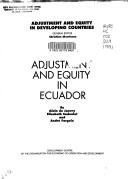| Listing 1 - 4 of 4 |
Sort by
|
Book
ISBN: 9264240780 9789264240780 Year: 1994 Publisher: Paris: OCDE. Centre de développement,
Abstract | Keywords | Export | Availability | Bookmark
 Loading...
Loading...Choose an application
- Reference Manager
- EndNote
- RefWorks (Direct export to RefWorks)
EC / Ecuador - Equateur --- VE / Venezuela --- 338.340 --- Algemene ontwikkeling in de Derde Wereld. --- Stabilisation économique --- Ajustement structurel (Economie) --- Aspect politique --- Algemene ontwikkeling in de Derde Wereld --- Stabilisation économique - Aspect politique - Equateur --- Stabilisation économique - Aspect politique - Venezuela --- Ajustement structurel (Economie) - Aspect politique - Equateur --- Ajustement structurel (Economie) - Aspect politique - Venezuela

ISBN: 9264135391 Year: 1991 Publisher: Paris OECD
Abstract | Keywords | Export | Availability | Bookmark
 Loading...
Loading...Choose an application
- Reference Manager
- EndNote
- RefWorks (Direct export to RefWorks)
Economic stabilization --- Structural adjustment (Economic policy) --- 313 --- 331.31 --- 331.33 --- 339.21 --- EC / Ecuador - Equateur --- 338 <866> --- 338 <866> Economische situatie. Economische structuur van bepaalde landen en gebieden. Economische geografie. Economische produktie.economische produkten. Economische diensten--Ecuador --- Economische situatie. Economische structuur van bepaalde landen en gebieden. Economische geografie. Economische produktie.economische produkten. Economische diensten--Ecuador --- Economic policy --- Adjustment, Economic --- Business stabilization --- Economic adjustment --- Stabilization, Economic --- Levenswijze en levensstandaard. Levensminimum. sociale indicatoren (Studiën) --- Economisch beleid --- Structureel beleid. Reglementering. Dereglementering. Ordnungspolitik --- Ongelijkheid en herverdeling van vermogens en inkomens. Inkomensbeleid --- Macroeconomics --- Income --- Economic policy and planning (general) --- Ecuador
Book
Year: 2016 Publisher: Washington, D.C. : The World Bank,
Abstract | Keywords | Export | Availability | Bookmark
 Loading...
Loading...Choose an application
- Reference Manager
- EndNote
- RefWorks (Direct export to RefWorks)
Weather risk and incomplete insurance markets are significant contributors to poverty for rural households in developing countries. Weather index insurance has emerged as a possible tool for overcoming these challenges. This paper provides evidence on the impact of weather index insurance from a pioneering, large-scale insurance program in Mexico. The focus of this analysis is on the ex-post effects of insurance payments. A regression discontinuity design provides find evidence that payments from weather index insurance allow farmers to cultivate a larger land area in the season following a weather shock. Households in municipalities receiving payment also appear to have larger per capita expenditures and income in the subsequent year, although there is suggestive evidence that some of this increase is offset by a decrease in remittances. While the cost of insurance appears to be high relative to the payouts, the benefits exceed the costs for a substantial range of outcomes.
Book
Year: 2016 Publisher: Washington, D.C. : The World Bank,
Abstract | Keywords | Export | Availability | Bookmark
 Loading...
Loading...Choose an application
- Reference Manager
- EndNote
- RefWorks (Direct export to RefWorks)
Climate change has considerably increased the likelihood of experiencing extreme weather events. Governments in developing countries have a limited capacity to smooth the losses created by extreme weather, and could potentially benefit from the introduction of disaster funds, that is, ex-ante budgeting allocations for post-disaster reconstruction. So far the implementation of disaster funds has been limited, in part because it is still unclear whether disaster funds provide a cost-effective way of coping with these losses. By taking advantage of the sharp rules that govern the municipal-level eligibility for reconstruction funds in Mexico, this paper provides some of the first estimates of the impact of disaster funds on local economic activity. The main finding is that access to disaster funding boosts local economic activity between 2 and 4 percent in the year following the disaster. Another finding is that the positive impact of disaster funds on local economic recovery can persist for as long as a year and a half after the disaster. Consistent with these findings, we additionally show that access to disaster funding leads to a large and sustained 76 percent increase in the growth of local construction employment. This labor market impact slightly precedes the overall increase in local economic activity.
Conflict and development --- E-business --- Environment --- Natural disasters --- Private sector development --- Urban development
| Listing 1 - 4 of 4 |
Sort by
|

 Search
Search Feedback
Feedback About UniCat
About UniCat  Help
Help News
News